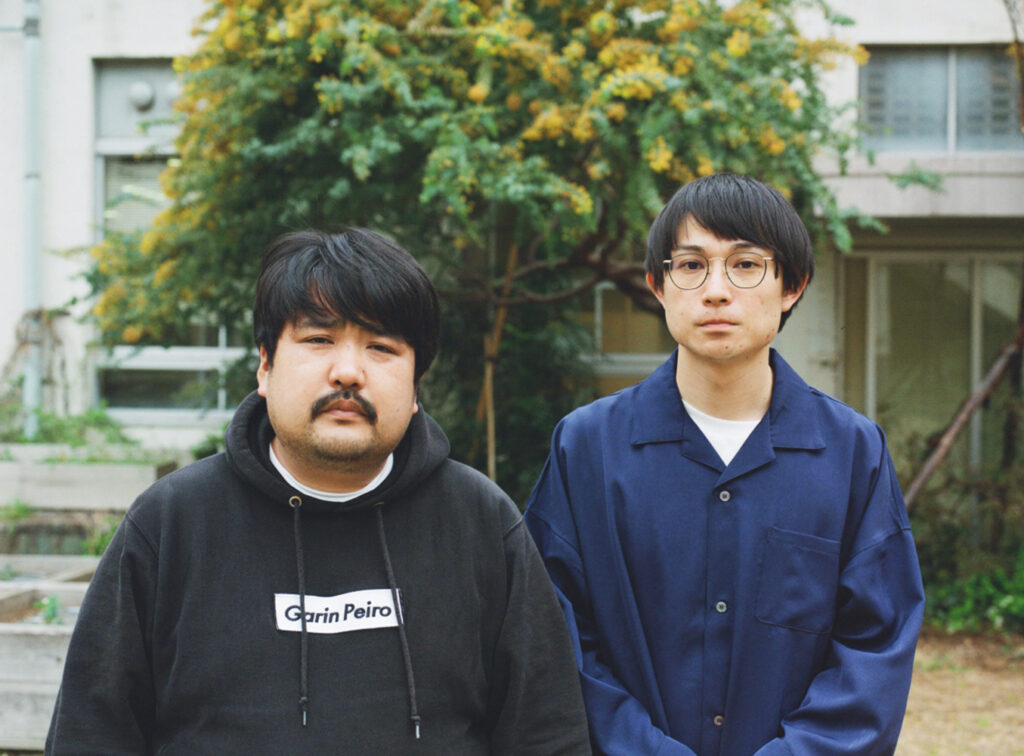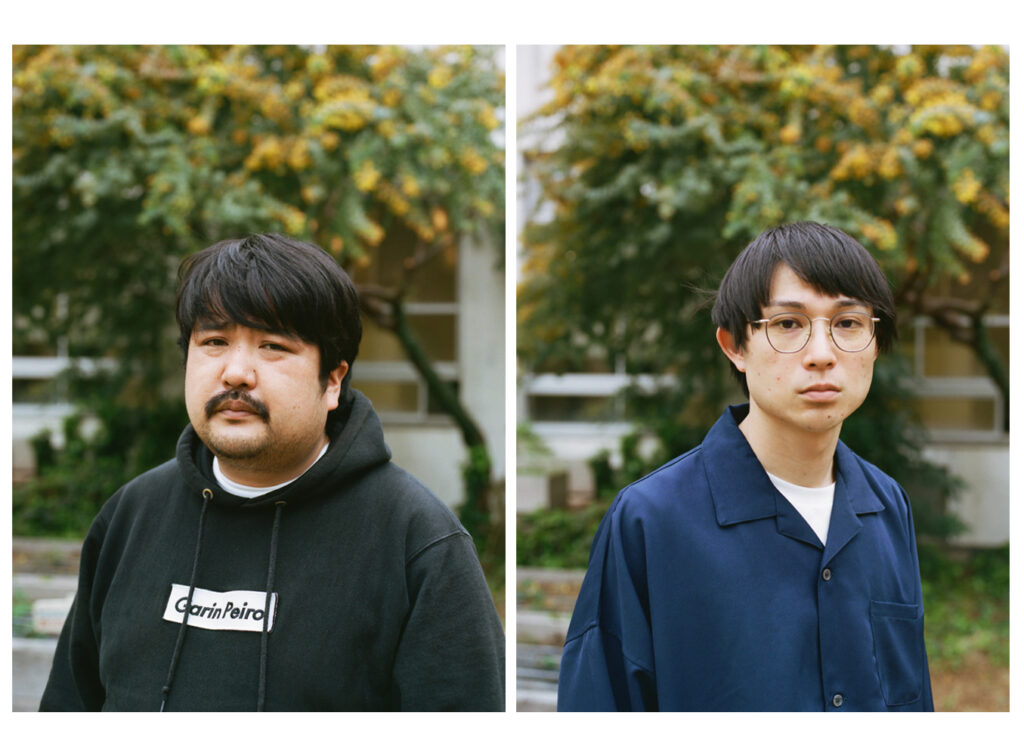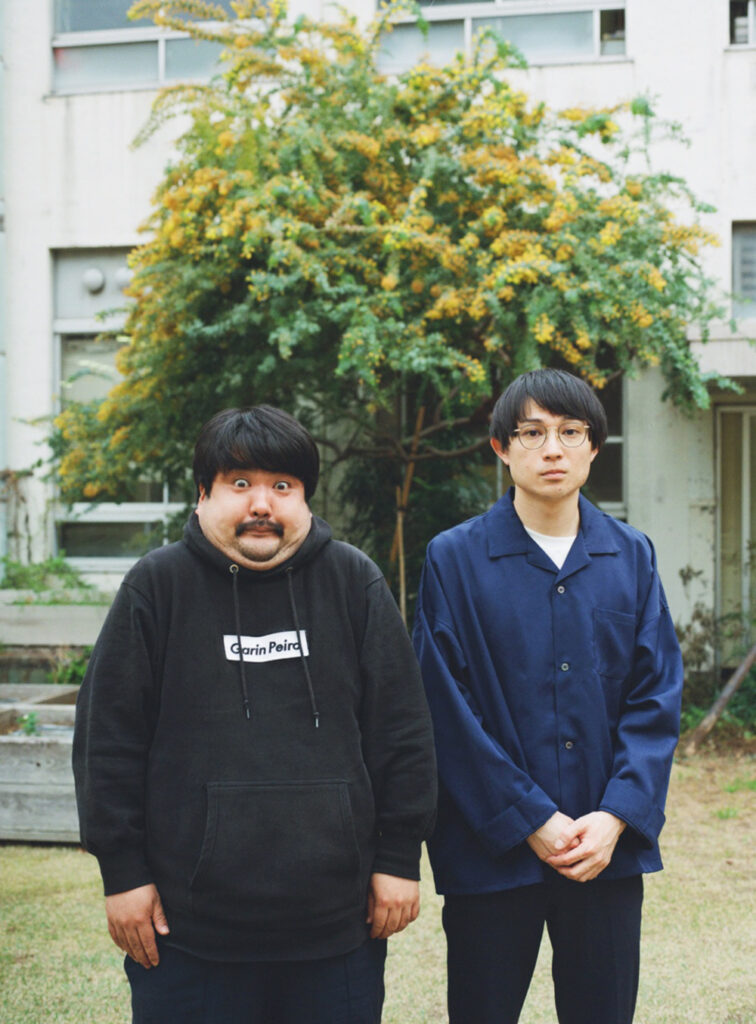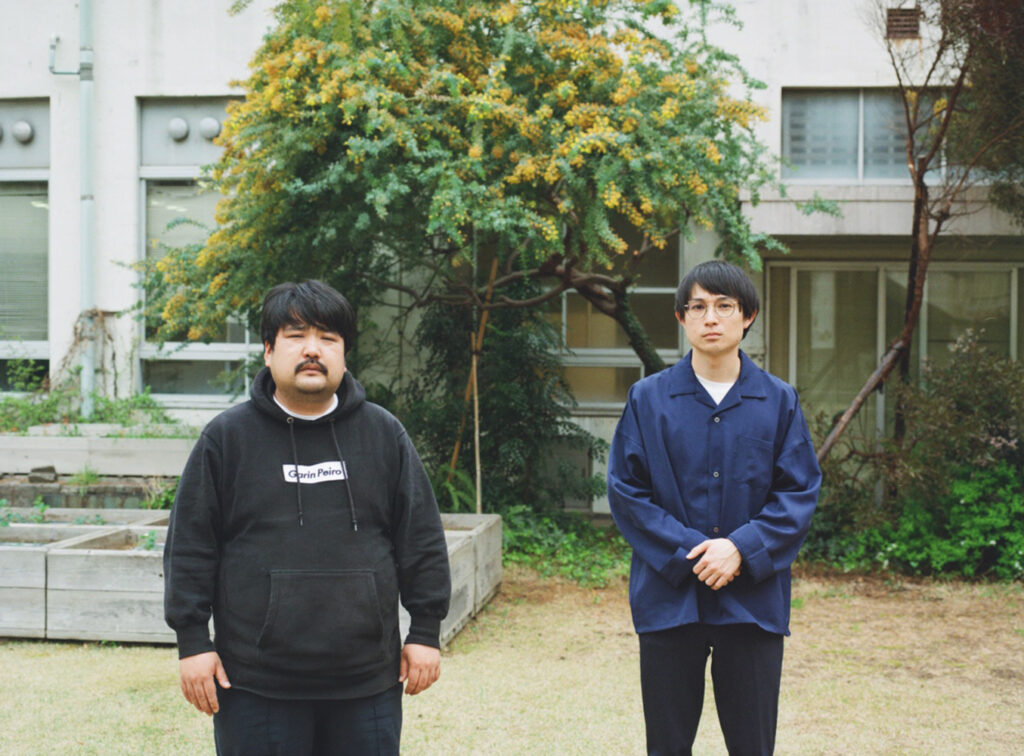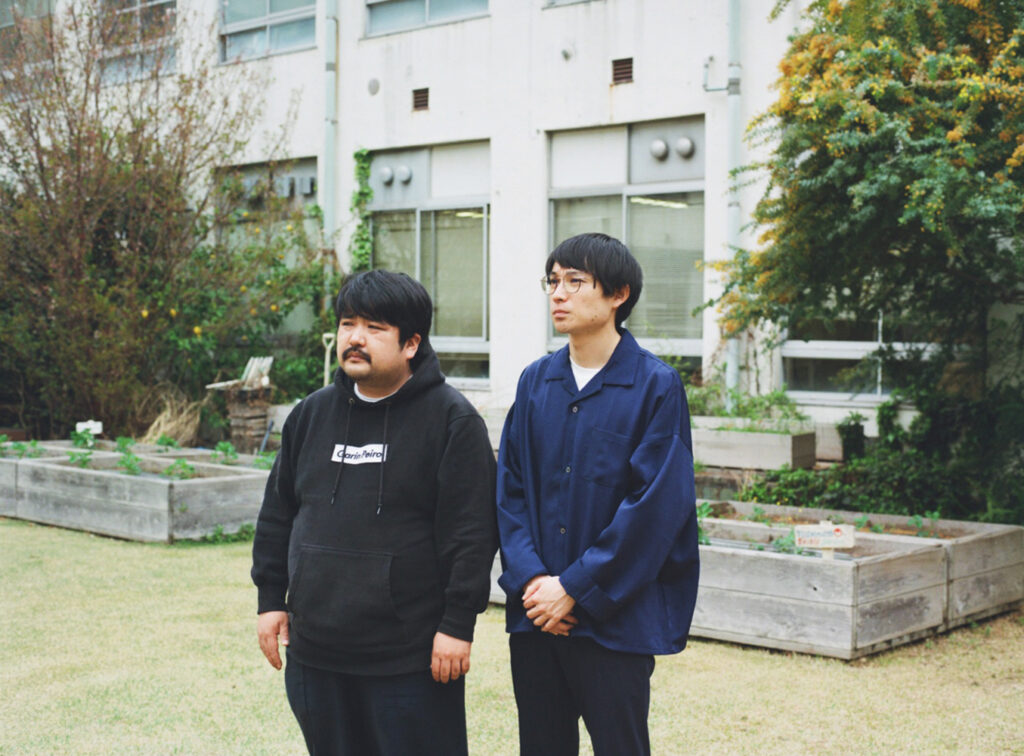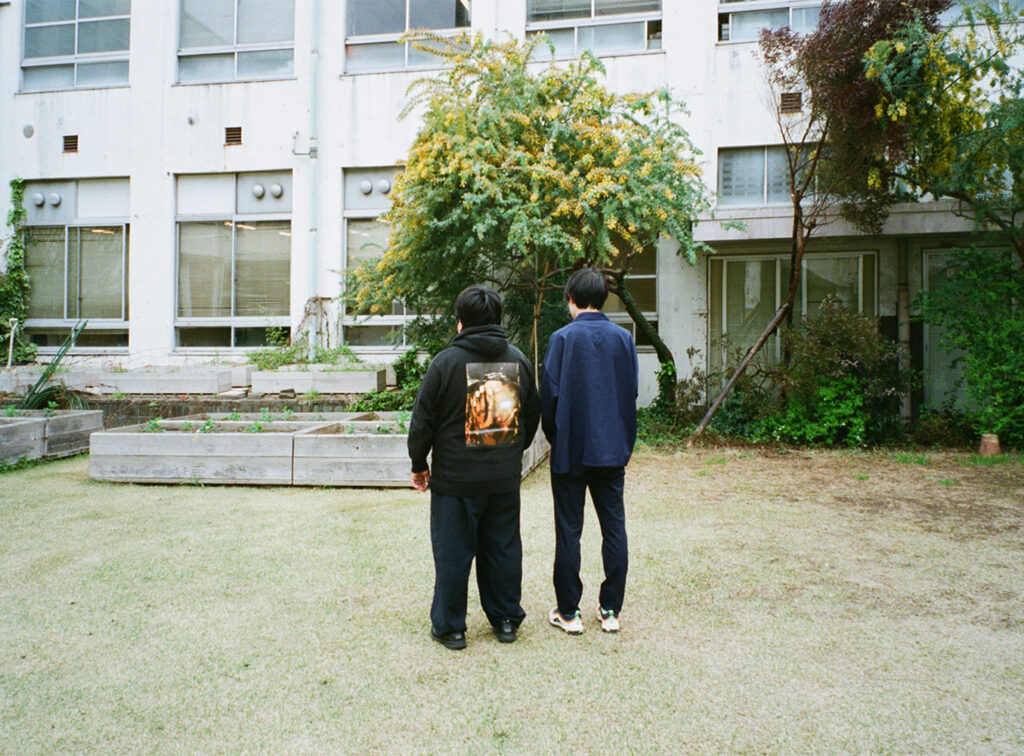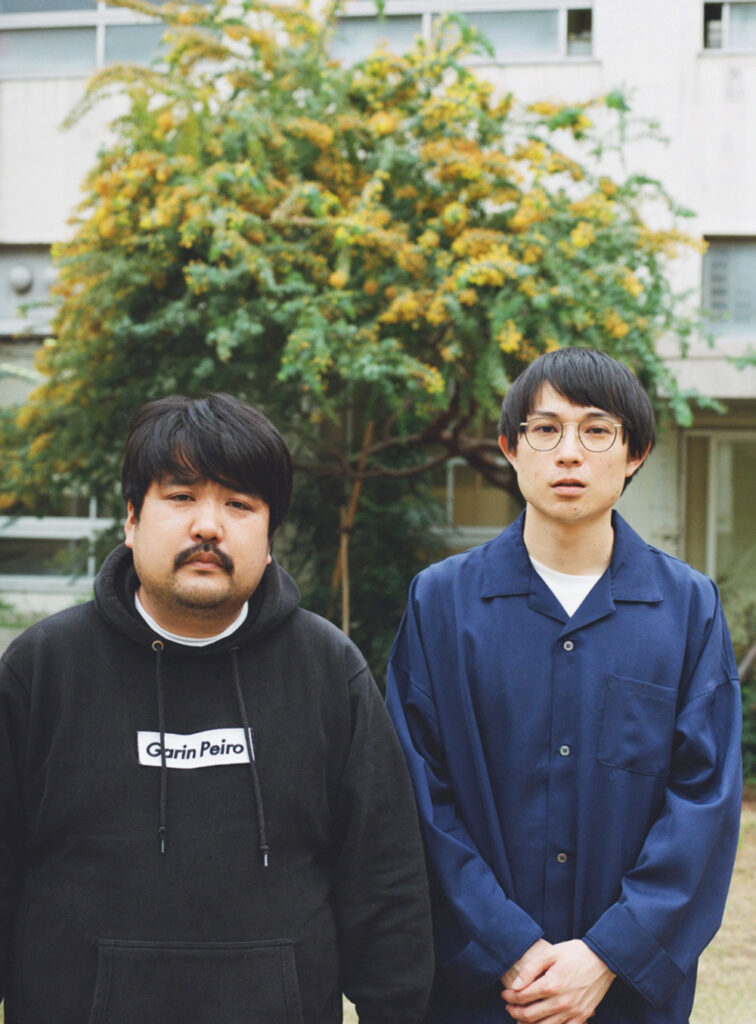The comedy duo Kuuki Kaidan is highly acclaimed for their comedic skills, even placing third in the 2020 King of Conte. Of course, while that can be attributed to their conte [a type of Japanese comedy involving short comedic skits] ability, it’s also the uniqueness of their characters that stands out: Mogura Suzuki is called a “kuzu geinin” [“scum comedian”] due to his episodes of debt, and Katamari Mizukawa’s cross-dressing is popular among some. Their conte sketches feature people who are a bit strange, but at the root of it all lies a certain kindness toward people. It’s reminiscent of The Blue Hearts and Ging Nang Boyz, two Japanese bands that influenced the duo.
anna, the duo’s fourth live show, was finally held in February 2021. It was originally scheduled to be held in March 2020 but was postponed due to the coronavirus, and in August, the replacement performance was also canceled. Finally, nearly a year after it was originally scheduled, they were able to hold their long-awaited live show. The tickets sold out immediately, with over 10,000 tickets sold and a huge buzz on social media.
The duo’s popularity continues to grow. Their radio show, Kuuki Kaidan no Odoriba (TBS Radio), was moved from Saturdays at 3:30 AM to Mondays at midnight and extended from thirty minutes to one hour. I interviewed the two in time for the DVD release of anna on May 19th.
*Please note that parts of the interview include anna spoilers.
Kuuki Kaidan’s conte roles aren’t fixed
——Thanks to the positive reception of the live stream on social media, you ended up selling over 10,000 tickets for anna. Do you guys feel like you sold more than you expected?
Mogura Suzuki: I was surprised. I was grateful that so many people watched us.
Katamari Mizukawa: I jokingly said on the radio that my target number of tickets was like 50,000 or 2 trillion, and even though I was joking at first, I started to gradually feel that way. So even when I heard 10,000 tickets, I did think, “Oh, just 10,000 tickets.” (laughs) But I’m super grateful.
——This is true of your usual conte performances too, but it’s funny how with some jokes, Mogura plays a weird person, and Katamari pokes fun at him, but with other jokes, the roles are reversed. Especially with the “coin laundry” sketch, it seemed like it wasn’t decided who would go in the laundry machine.
Katamari: A while back, we had a sketch about going into a mailbox, so we started making that [coin laundry] joke with the idea that we wanted to do another sketch like that. We wanted to make the sketch about washing your soul with a laundry machine.
Mogura: We have some sketches where we’ve already decided who does what to begin with, but we made that sketch without deciding.
Katamari: A show is one and a half to two hours, so it’s hard for one person to keep playing the role of the weird person the whole time.
——You guys mentioned on the radio that when you rehearsed, it was way too long, so you had to struggle to cut the time down the day before the show. What parts did you end up cutting out?
Katamari: That was just a logistical issue—like not being able to change costumes in time.
Mogura: The intervals between sketches were long. We just cut down the time it takes to set everything up by deciding we didn’t need a table or multiple washing machines.
Katamari: When we rehearsed, I was surprised by how long it was. I guess we really should have checked that before the rehearsal. But we did actually tweak the jokes after seeing the response to them on the first day.
——Katamari, I heard that before this show, you worked as a writer for the TV drama, Dekke Furoba de Mattemasu, and that experience came in handy for anna.
Katamari: I did indeed reply that “I put my skills to use” when I was asked, but…
Mogura: So, you mean you lied?
Katamari: I was asked, “Did it influence your conte?” and I said, “Sure.” But, when I was writing the script for the drama, I asked the other staff members for their opinions, they taught me stuff like, “If you dig a bit deeper into the script, the overall story will be easier to understand, and the jokes will stand out.” So I suppose I did put my skills to use.
anna is full of love for the radio
—— anna is the title of the show as well as the last skit. Why did you choose to make this sketch the focal point?
Mogura: We came up with that idea pretty early on. And we love the radio, so we put it at the end. Also, even while thinking of the progression, we knew that it was going to be long, so we had no other option but to bring it to the end.
——What was the intention behind making the various sketches connect towards the end?
Katamari: Even just living your life, when you reflect on it later, don’t you sometimes realize that this or that happened, and they were connected? I personally like that kind of thing, so I wanted to include it. I like the way that in everyday life, the inevitable things, the things that aren’t your fault, sometimes overlap. If you look at the overall picture, some topics aren’t connected at all, but even as a viewer, I like that sort of thing.
Mogura: But I don’t like the idea of forcing connections, so basically, we make all the conte sketches one by one without thinking of the connections, and when they’re done, we try to find parts to connect and come up with ideas about what would be interesting to connect here and there.
——Earlier, Mogura mentioned, “We like radio.” I could feel that in the conte. What does radio mean to you both?
Katamari: I think the radio is very intimate. Listening to Bakusho Mondai Cowboy, I’ve noticed that on the radio, they constantly talk about things they don’t talk about on TV. Even as a listener, it feels very intimate. It feels like they’re only talking to me.
Mogura: TV is open, so it feels like a public park. But radio is more like a hideout. There are invisible things called “radio waves” flying around, and when you tune in and find those radio waves, you feel the excitement of hearing adults talk about the kind of things they can’t say in public. I think that’s how I got into radio.
——What do you think now that you’ve actually become a radio personality?
Katamari: I’m frantically trying to ensure that I can keep this up, even if it’s just for another day!
——But Kuuki Kaidan no Odori Ba is doing well. In April, it started being broadcast on Mondays from midnight to 1 AM.
Katamari: I’m really grateful. I’m happy that we can talk about more things now that our broadcast time has gone from thirty minutes to an hour. Now we can play the music that we like, too.
Everyone has some good in them, so don’t judge a book by its cover.
——The people who appear in the conte sketches in anna, like DJ Charles Miyagi, are all a bit weird. But on the other hand, there’s something endearing about them that makes them hard to hate.
Katamari: That’s true. I think it’s because they don’t do anything that’s totally impossible to understand. We make those sketches because we have a feeling of sympathy within us, or a feeling of “They have a point.” The crazy people are still crazy people, but I don’t think they’re the type to make the receiving end totally shut down. We try to depict a sense of how we might respond if such a person existed.
——Even in sketches that teeter on the edge of going too far, I think Kuuki Kaidan’s conte tends to have a happy ending.
Katamari: If we were able to do it skillfully, it’d be really funny to have something almost go too far. But it’s really difficult to make something like malice funny for everyone, so maybe it’s because we don’t have that skill [that it tends to have a happy ending].
——In any case, I think you guys convey the pain of a person who is an outcast. Whether it’s the Kame-chan character Mogura plays in the “27-year-old” skit at the beginning of anna, or the Makimura character Katamari plays in “coin laundry,” everyone has some good in them, don’t they? At the core of your comedy, I feel a certain kindness towards people.
Katamari: Makimura may look like that, but actually, he’s usually a diligent worker. (laughs)
Mogura: I think everyone has a good side. But we tend to block it out just because of appearances, saying, “Don’t get too close to that person.” Of course, that might be the less dangerous option, but that doesn’t mean that those people are actually dangerous. There were actually people like that in my hometown, and I’ve been told by people like my teachers, “Don’t get involved with people like that.”
Katamari: And also, none of us can say for sure that we’re not on the side of the outcasts. If we started showing those characteristics, we might find ourselves on the side of being talked about like, “Don’t get involved with them.” I think that definitely happens.
Mogura: Sometimes, people are just able to hide it well.
——In the sketch, “Megaton Punchman Café,” it left an impression on me when Mr. I-Hope says, “From this perspective, it’s right, but from the other perspective, it’s evil.” It made me think that you guys are conscious of that way of looking at things.
Mogura: Things change depending on your position and situation. It’s harder to decide what’s right, and that’s what Mr. I-Hope…
Katamari: Maybe that’s what he wanted to teach people.
Mogura: Everyone is weird if you really think about it.
“I feel awkward [doing manzai].”
——After watching anna, I remembered how great conte is. What does conte mean to you?
Mogura: Conte is conte, but what I like about it is that you can make a full story within that.
Katamari: It’s hard to talk about what’s good about it. To be honest, when we did manzai during NSC, they got mad at us, so that’s part of why we do conte…
——I heard that you’re shy about doing manzai.
Katamari: Yeah. I feel awkward.
Mogura: I guess it’s because we’re always doing conte. Maybe it’s like, if you’re always serving shoyu ramen, and suddenly you decide to serve miso ramen, it’s awkward.
Katamari: Also, there are just no situations in conte where you can see the faces of the audience.
Mogura: There’s also the technique. It’s a world that includes the audience to begin with.
Katamari: With manzai, you come out on the stage and charm the audience, like, “Watch us!” With conte, it quietly starts and is like, “Watch if you’d like.”
——I just thought of this, but do you guys do an introductory talk or explanation?
Mogura: We’ve done it a number of times.
Katamari: Because we were more nervous than the audience.
Mogura: There are people in the audience who were looking forward to the program and even took off work for it, and the staff members put a lot of thought into making the program. We thought it wouldn’t be right if we were too shy to speak up despite that. If we didn’t think that deeply about it, we might be too shy to even perform. (laughs)
――Lastly, since anna is going to be released on DVD, could you say something about that?
Mogura: We’re part of the DVD generation, so as entertainers, we’ve always wanted to put out a DVD.
Katamari: I watched a ton of rental DVDs after I quit college and had nothing to do, and it saved my life. In terms of the bonus footage, the radio director [Kyohei Koshizaki] took the liberty of recording some video, and quite a lot of that is included as bonus footage.
Mogura: So, we hope people enjoy that. Also, I think people who saw it in the theater can enjoy it too, because on the DVD, there’s camera blocking and transitions.
Kuuki Kaidan
official site
https://www.kukikaidan-okujo.com
YouTube
https://accounts.youtube.com/accounts/SetSID
Katamari Mizukawa(RIGHT)
Katamari was born in Okayama Prefecture on July 22nd, 1990. His hobbies include reading, taking walks, playing futsal, reading picture books, and playing the Toto soccer lottery. His special skills include his extensive knowledge about European soccer (he remembers every player), guessing people’s blood types, and Tetris. He is a graduate of the 17th generation class at NSC Tokyo. Twitter:@kkkatmari
Mogura Suzuki(LEFT)
Mogura was born in Chiba Prefecture on May 13th, 1987. His hobbies include playing shogi, ping-pong, reading manga, hanging out at parks, mahjong, listening to music, and going to izakayas. His special skills include shogi (amateur 2-dan), mahjong (amateur 4-dan), jump roping (he can do triple unders), and ping-pong (ranked 16th in Chiba Prefecture in middle school). He is a graduate of the 17th generation class at NSC Tokyo.@suzuki_mogura
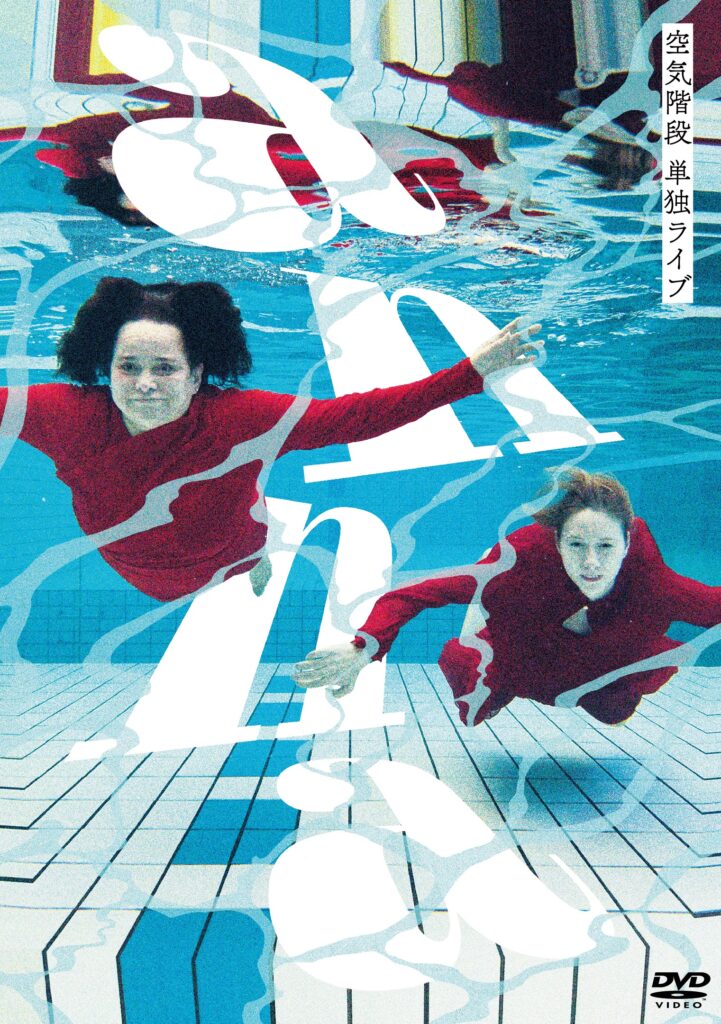
■Kuuki Kaidan: anna live performance
The comedy duo’s 4th live show, anna, is being released on DVD for the first time.
Release date: May 19th, 2021
Price: ¥3,850
https://www.tbsradio.jp/562457
Twitter:@kuki_tandoku
Twitter:@kuki_odoriba
Photography Takahiro Otsuji(go relax E more)
Translation Aya Apton

